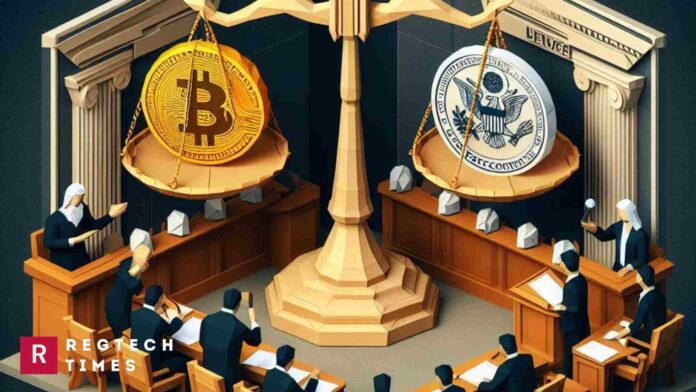Coinbase, the largest cryptocurrency exchange in the United States, is facing a significant legal challenge as customers allege that its entire business model has been illegal since its inception. The Coinbase lawsuit, filed in the Northern District of California by the prominent law firm Scott+Scott, represents plaintiffs primarily from California and Florida.
These customers assert that Coinbase has knowingly, intentionally, and repeatedly violated state securities laws through its sales of digital assets.
In response, Coinbase has vehemently denied these claims, labelling them as “legally baseless” and expressing full confidence in the judicial process. This lawsuit mirrors another case against Coinbase, which had previously been dismissed but was partially revived by a recent ruling from the 2nd U.S. Circuit Court of Appeals, indicating the potential gravity of the allegations.
History of Coinbase Lawsuit By SEC
On April 26, John Deaton, a crypto lawyer and current candidate running an election campaign to unseat Senator Elizabeth Warren, filed an amicus brief in the U.S. District Court for the Southern District of New York. The brief was in support of a motion for interlocutory appeal on behalf of 4,701 Coinbase customers.
This Coinbase Lawsuit is distinct from Coinbase’s ongoing legal battle with the Securities and Exchange Commission (SEC) over the classification of tokens sold on its platform. Coinbase has taken an aggressive stance in this matter, filing an interlocutory appeal to challenge a judge’s decision to allow the case to proceed.
The outcome of this appeal could have significant implications not only for Coinbase but for the broader cryptocurrency industry as well.
The new Coinbase lawsuit claims that Solana, Polygon, Near, Decentraland, Algorand, Uniswap, Tezos and Stellar Lumens tokens are securities. This new Coinbase lawsuit also claims that the exchange’s digital asset sales knowingly violated state securities laws since the company’s inception.
Lawsuits are becoming popular in the crypto currency domain as the bitcoin prices are rising.
SEC Seeks $2 Billion in a Landmark No-Fraud Ripple (XRP) Case
The attorney leading this class-action suit, John T. Jasnoch, has a history of litigating against cryptocurrency companies and projects, including well-known entities like Safemoon and Ethereum Max.
Legal experts suggest that while the SEC case will likely determine the broader question of whether digital assets should be classified as securities, the fate of this particular lawsuit may be closely tied to the outcome of Coinbase’s legal showdown with the SEC.
In addition to the securities-related lawsuit, Coinbase is also facing another class-action suit alleging that it misled customers into purchasing digital assets that qualify as securities. The plaintiffs in this case argue that cryptocurrencies such as Solana, Polygon, and Stellar Lumens should be recognized as securities, and they accuse Coinbase of breaching securities laws by promoting these assets without proper registrations.
You May Also Like
- Coinbase vs. SEC: Redefining Investment Contracts
- Trial of Tornado Cash Developer Sparks Debate on Crypto Innovation and Legal Boundaries
- Zhao Faces Prison Sentence for Enabling Money Laundering: A Cryptocurrency Giant in Turmoil
- The FTX Saga, and the Road Ahead for Cryptocurrency and Cryptocurrency Exchanges
Coinbase Lawsuit to Classify the Role of Securities Broker
The lawsuit focuses on Coinbase’s role as a “Securities Broker” as per its user agreement and its operations involving Coinbase Earn accounts. These accounts allegedly violated securities laws by promoting higher-yield investments without adequate disclosures. To address ongoing legal pressures, Coinbase has sought to clarify the definition of an “investment contract” through an interlocutory appeal, a move that could have broader implications for its legal strategy moving forward.
You may like to read Blockchain Bandits
These legal challenges underscore the complexities and uncertainties surrounding the regulatory environment for cryptocurrencies. With Coinbase at the centre of these legal battles, the outcomes could potentially reshape the landscape of the entire cryptocurrency industry.


